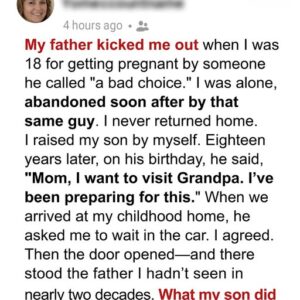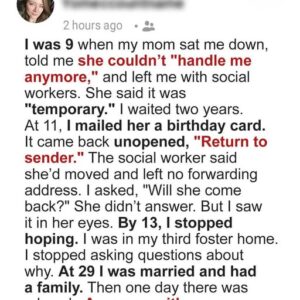When Talia overheard her teenage son and his friends laughing in the next room, she didn’t expect to become the punchline. “She’s just a maid,” one of them scoffed. The others laughed. She stood there in the hallway, silently folding laundry with her baby on her hip—no yelling, no tears. Just a quiet snap. Not the kind that explodes. The kind that settles into clarity. For years, Talia had been the glue of their household. She cooked every meal, cleaned every surface, held every schedule in her head, and gave pieces of herself to everyone else. She loved them fiercely, but somewhere along the way,
that love had become an expectation. Not a gift. A given. Even her husband, once her biggest supporter, had started referring to her efforts with eye-rolls and tired jokes—”The laundry fairy strikes again!” or “You’ve got the easy job, staying home with the kids.” Always said with a smile. Always followed by silence. But that overheard moment of casual cruelty cut deeper than anything else. It was the sound of her own value being erased, in the voices of the people she loved most. What they didn’t know was that Talia had been quietly investing in herself for years—late nights spent freelancing while everyone slept,slowly building a portfolio and reputation as a copywriter. She wasn’t just anything. That night, she left them a note. Packed up the baby, l oaded the car, and drove to a remote cabin she’d rented for a full week. No drama. No argument. Just space. It wasn’t abandonment. It was a statement.Back at home, the silence roared. Laundry piled up. Meals were burnt—or not made at all. The baby’s routines fell apart. Her son tried to clean but didn’t know how. Her husband didn’t know where the diapers were kept. The house fell into chaos. And slowly,
the boys in her life began to realize just how much Talia had done—and how little they’d truly seen her. When she returned a week later, there were no grand gestures waiting. Just a quiet home, humbled. Her son apologized first, looking her in the eyes for the first time in a long time. Then her husband followed, his jokes replaced with help, effort, and listening. These days, the house is still busy—but different. Her son sets the table without being asked. Her husband learned to cook. The jokes are gone, replaced with genuine respect. Talia still cleans, still cares. But now, she does it by choice. On her terms. And everyone knows better than to ever call her just anything again.





